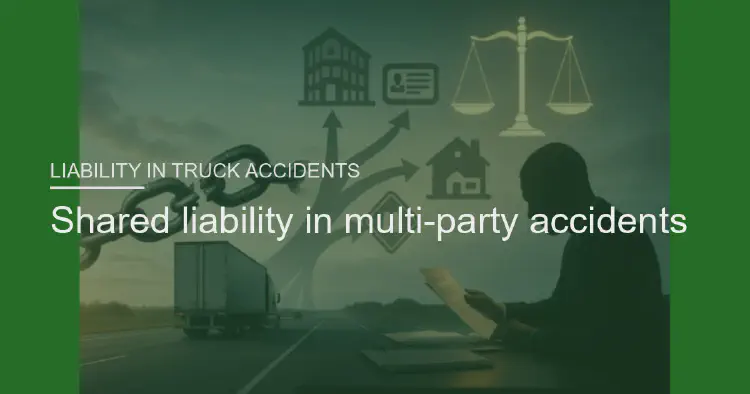Shared liability in multi-party accidents
Truck accidents often involve more than one negligent party. Determining who is legally responsible can be complex, as liability is frequently divided among drivers, companies, contractors, and even government agencies.
- Truck Accident Law Team
- 2 min read
Article 6 of 6 in Liability in Truck Accidents/

Shared Liability in Multi-Party Truck Accidents
Why Shared Liability Is Common
- Commercial trucking involves multiple stakeholders: drivers, employers, brokers, maintenance providers, and manufacturers.
- A single accident can result from combined negligence, such as driver fatigue, poor maintenance, and defective parts.
Examples of Shared Liability
- Driver and Trucking Company
- A fatigued driver crashes after being pressured by the company to meet unrealistic deadlines.
- Manufacturer and Maintenance Contractor
- A defective brake part fails, made worse by negligent maintenance.
- Government Entity and Driver
- Poorly maintained roads combined with speeding by the truck driver.
- Cargo Loader and Trucking Company
- Improperly secured cargo causes rollover, and the company failed to supervise loading.
Legal Doctrines
- Comparative Negligence: Courts assign fault percentages to each party. Plaintiffs may recover damages reduced by their share of fault.
- Contributory Negligence: In some states, if a plaintiff bears even slight fault, they may be barred from recovery.
- Joint and Several Liability: In certain jurisdictions, plaintiffs can recover the full amount from any liable party, who may then seek contribution from others.
Evidence in Shared Liability Cases
- Accident reconstruction reports to determine multiple contributing causes.
- Maintenance logs, driver logs, and cargo manifests to assign responsibility.
- Expert testimony to apportion fault among defendants.
Litigation Strategy
- Plaintiffs often name all potentially responsible parties to maximize recovery opportunities.
- Defendants may attempt to shift blame to each other, creating a complex trial dynamic.
Summary: Shared liability is common in truck accidents due to the involvement of multiple entities in trucking operations. Courts apportion fault among responsible parties, and understanding these interactions is key to securing fair compensation for victims.
You might also like:
- Tags:
- Truck Accidents
- Expert Testimony
- Trucking Company
- Accident Reconstruction
- Comparative Negligence
- Driver Fatigue
- Truck Driver
- Maintenance Logs
- Contributory Negligence
- Poor Maintenance
- Shared Liability
- Negligence States
- Driver Logs
- Defective Parts
- Driver Trucking
- Responsible Parties
- Commercial Trucking
- Negligent Maintenance
- Multi Party
- Plaintiffs Recover
- Driver Trucking Company
- Contributory Negligence States
- Plaintiffs Recover Damages
- Fault Contributory Negligence
- Result Combined Negligence
- Poorly Maintained Roads
- Multi Party Truck
- Meet Unrealistic Deadlines
- Reduced Share Fault
- Share Fault Contributory